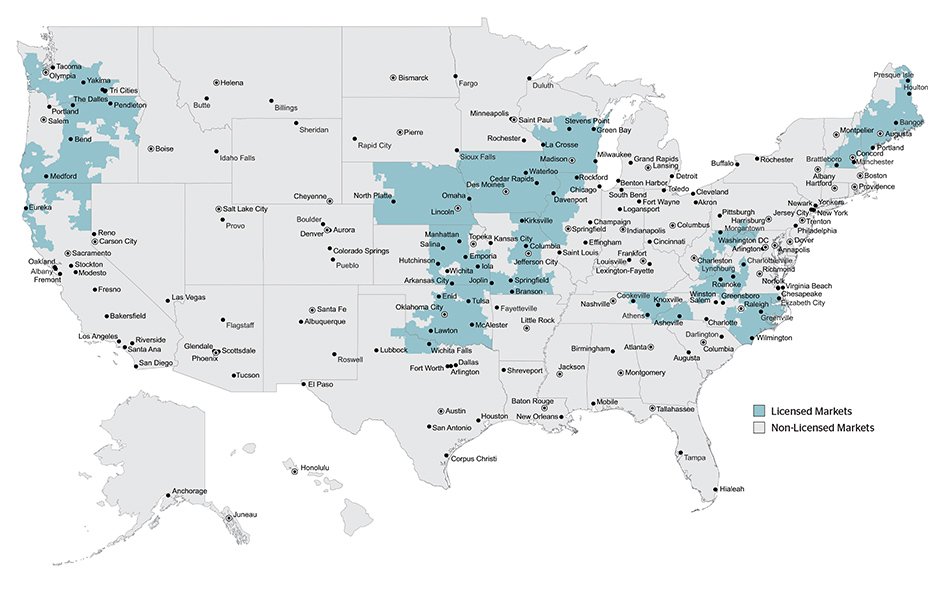U.S. Cellular’s decision to throttle ‘Unlimited’ Plan customers without notice is everything that’s wrong with the world
U.S. Cellular, founded in 1983, serves more than 4.5 million customers in 21 different states. But, despite claims to be a nationwide service provider, the company actually functions more like a regional carrier.
Have you ever gone to visit the in-laws and wondered why your cell phone doesn’t work in their small town? Or, maybe, you’re about to hit the highway on a road trip and your coverage fails.
To my surprise, I had a similar experience just last week. The only difference? I was in the middle of Detroit, Michigan.
As a traveling artist, I spend time in all corners of the country. Early this year, I lived in Phoenix, Arizona. This summer, I was in Chicago. Currently, I’m on my way to New York City.
Wednesday morning, while driving through a part of northern Detroit, every app on my phone simply refused to load. The problem persisted through two troubleshooting calls with Apple Support, a software update and multiple attempts to reset the phone. So I reached out to my mobile carrier, U.S. Cellular.
What I discovered was horrifying.
My “Unlimited” Plan was being throttled due to a new policy that severely limits a customer’s data allotment in markets outside of the company’s primary service area, which is largely limited to the Midwest and excludes Chicago, St. Louis and Kansas City and nearly every other major city in the country. The policy, instituted in secret on August 8, was not properly communicated to customers, in violation of U.S. Cellular’s own company standards and Service Agreement, which require advance notice of “material changes … that negatively impact [customers’] use of the Service.” Language on the company’s official website has not been updated to reflect the new policy, nearly a month later.
This screenshot of the U.S. Cellular website, taken September 1, does not mention the 20 gigabyte data limit.
The policy downgrades customers’ “roaming” allotment from fifty percent of monthly data usage to a grand total of 20 gigabytes. In other words, any customers with “Unlimited” plans who venture to Los Angeles, the East Coast, Florida or visit any major Midwestern city — with the exception of Omaha, Nebraska — could have their non-Wifi internet cut off.
U.S. Cellular, the fourth largest American cell phone company, bills itself as a nationwide service provider, boasting “the highest network service of any national carrier.” Contrary to this claim, customer billing statements include a fine-print disclaimer that customers must reside “within a UScellular licensed market” on the very bottom of the second page. Essentially, U.S. Cellular piggybacks on other “partner” networks for the majority of their nationwide coverage, a practice that isn’t uncommon among carriers. However, no other nationwide carrier relies so heavily on piggybacked coverage and then treats that coverage differently, to the detriment of their customers.
It’s a contradiction that seems ridiculous in this day and age where geographic mobility is more common than ever. Of course small, regional carriers still exist. But the real crime isn’t U.S. Cellular’s limitations — it’s their insistence on masquerading as something they are not.
This map shows U.S. Cellular’s primary service area, which excludes the majority of the country, including most major urban areas.
In fact, some retail salespeople aren’t even aware of the network’s limitations. Those that were said they don’t mention it to customers unless they’re specifically asked.
“It’s not something that we’re trained on,” said a Wisconsin-based sales rep.
Growing up in Milwaukee, Wisconsin, the company has been a recognizable name for decades and three years ago, lured by affordable prices and free iPhones, my family decided to join the U.S. Cellular family. For the time being, we were all anchored in Southeastern Wisconsin, and the honeymoon phase was just fine. Still neither I nor my mother, the primary account holder, recall being informed of the “50 percent” data requirement or the limited service area.
“I would remember that,” she said.
In the time since, I experienced a personal artistic renaissance and blossoming of creative talent that caused me to sell my home and strike out for greener pastures. We likely slid through the cracks because my mother still lives in the house where I grew up. So, my location changed, while our address stayed the same.
Still, I don’t feel the expectation that I could count on my cell phone company to provide unlimited nationwide service — when that’s what was advertised, and paid for — is unreasonable.
Apparently, the decision by U.S. Cellular to limit “Unlimited” data plans was made as a result of more and more customers moving, or traveling, into different areas of the country, changes that have, no doubt, caused the company’s costs to increase (as they are required to pay fees for service provided through partner towers). Interestingly, this means other customers were likewise unaware of the limited network, believing U.S. Cellular’s marketing language while passing over the small print at the bottom of their billing statements.
But, rather than communicate clearly or come to their customers with this conundrum, U.S. Cellular instead chose to conceal the realities about its coverage. Rather than opening up a dialogue and attempting to find a balance that would satisfy both the needs of their business and customers, higher-ups decided to make an ill-informed choice behind closed doors. A decision they knew would be so poorly received they chose not to disclose it.
For all I know, U.S. Cellular could be struggling … but its more-than-4-billion dollars in yearly revenue makes me think otherwise. The likelihood is the service provider could swallow these additional costs at minimal effect to shareholders or company big-wigs. In contrast, their decision to throttle data and cut off service for customers will likely affect individuals like myself, whose ability to provide for themselves is dependent on accessing wireless data. Whether I’m uploading a clip to TikTok to grow my artistic community, posting a photo to market my activewear brand or driving for Uber to supplement my income, I need to be connected. I — and millions of people just like me — quite literally rely on our service to make a living.
Granted, I may be an extreme example. But, just imagine being someone who lives in the outskirts of St. Louis, Kansas City or Chicago. Your address is in the primary service area but you have to go into the city to work your mobile delivery job with Doordash, Instacart or one of the many other apps gig workers use to scrounge up a living in our strained economy. And, once you hit your limit, you can’t work anymore.
The fact that the service we pay for was not only drastically reduced but that the company decided we didn’t deserve to know put me in a situation that created genuine panic. Had I been properly informed, I wouldn’t have chosen to upgrade with U.S. Cellular less than two weeks before. Rather than communicate proactively, they left me out in the wild, forcing me to find out for myself.
Now, to U.S. Cellular’s credit, they are allowing me to return my phone and will refund the payments I’ve made, an exception I believe they should make for anyone else in a similar situation. I hope decision-makers will sincerely consider re-evaluating this policy, rethink their communication strategy and, perhaps, even begin to create a dialogue with their customers. In fact, the one redeeming aspect of this fiasco was the outstanding supervisor who heard out my complaint and the Solutions Department that worked with me to create a scenario where I could be made whole.
And, while the trouble was real, the timing was divine. Thanks to a bit of providence, I was able to find a provider that will fit my needs, as I move into the next chapter of my life. Yes, the experience undeniably cost me valuable time and money. But it also taught me an important lesson: always read the fine print.



